
An MP’s first duty is to their constituency. I believe it’s so important for me, as YOUR elected representative, to be out and about and accessible, to listen to and represent YOU! And not just at election times!
That’s why, in addition to the 1000+ casework and correspondence emails, letters and telephone calls I receive each week, as well as my various campaign work, I run a regular programme of Supermarket and Community Surgeries here in Mid Norfolk – moving them around the constituency to make it as easy as possible for people to come and see me.
My latest Supermarket Surgery took place this past Friday at The Pavilion at Bullock Park in Shipdham – where I met dozens of constituents from both Shipdham and Cranworth, discussing a range of specific casework matters and/or wider policy topics on issues including flooding, speeding on country lanes, access to GP appointments and NHS dentistry and local crime.
I was delighted to be joined by Cllr Lynda Turner (District Councillor for Shipdham and Scarning Ward), Cllr Ed Connolly (County Councillor for Yare and All Saints Division) and Giles Orpen-Smellie (Police and Crime Commissioner for Norfolk) – with various local parish council representatives in attendance too.
Engagement with my constituents is such a vital part of my job and I relish the chance to have YOU come along and ‘bend my ear’.
If YOU would like to come along and informally bend my ear at one of my upcoming surgeries, please do contact me at george.freeman.mp@parliament.uk
Or if YOU would just like some help with an issue, or to make me aware of a policy concern, please do send over your comments via email for me to pick up too.
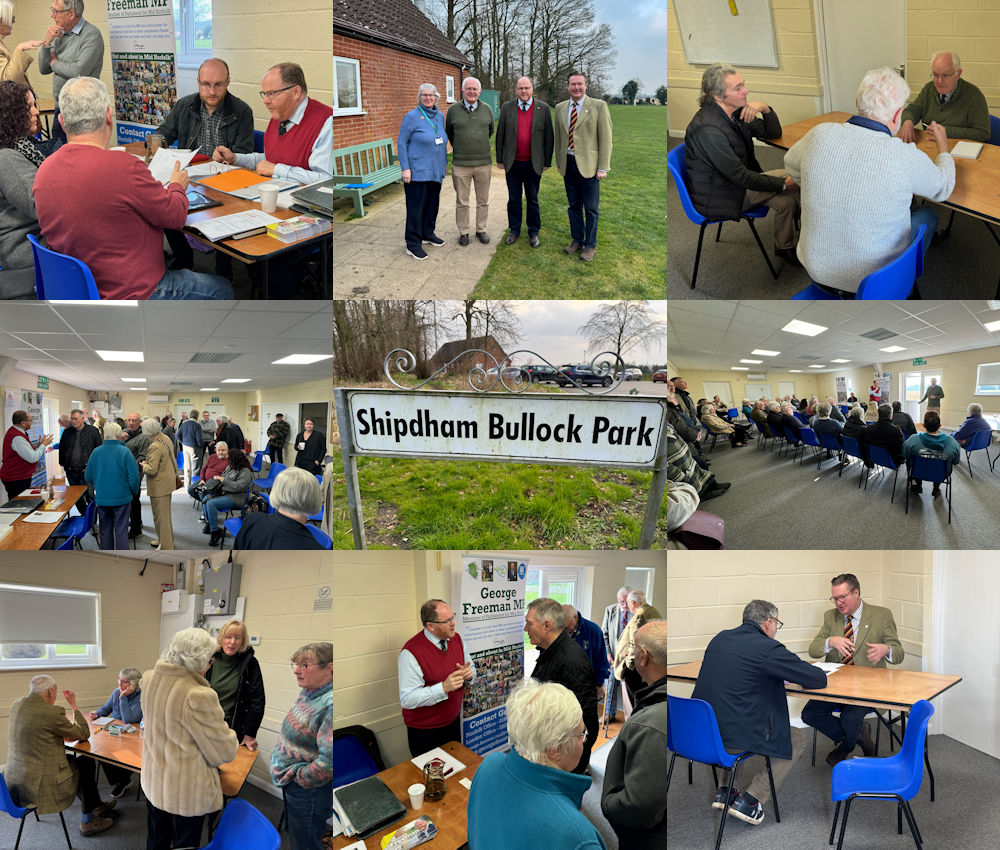
Millions of people across the country play, watch and enjoy sport every day.
That’s why, throughout my time as a local MP, I have done my utmost to support the many local community sports clubs and facilities that do fantastic work across Mid Norfolk. The goodwill and generosity of the local people that run them is a key part of what makes Mid Norfolk great.
I am therefore delighted to be able to share this Budget 2024 week that Mid Norfolk has received £35,037 so far as part of the Government’s Multi-Sport Grassroots Facilities Programme:
|
Place |
Grant Award |
Project Funded |
|
|
Gaymers Meadow, Attleborough |
£1,080 |
Goalposts |
|
|
Hingham Sports and Social Club |
£2,006 |
Goalposts |
|
|
Mattishall Primary School |
£698 |
Goalposts |
|
|
Hockering Playing Field |
£1,504 |
Goalposts |
|
|
Bawdeswell Recreation Ground |
£4,987 |
Goalposts and Floodlights |
|
|
Watton Sports Centre |
£1,250 |
Goalposts |
|
|
North Elmham Playing Field |
£1,354 |
Goalposts |
|
|
Swanton Morley Playing Field |
£570 |
Goalposts |
|
|
Toftwood Recreation Ground |
£831 |
Goalposts |
|
|
New Buckenham Village Hall |
£1,013 |
Goalposts |
|
|
Bawdeswell Recreation Ground Further |
£1,038 |
Goalposts |
|
|
Necton Sports and Social Club |
£1,080 |
Goalposts |
|
|
Ashill Community Centre |
£4,416 |
New Floodlights |
|
|
Easton College |
£6,120 |
Goalposts |
|
|
Gaymers Meadow, Attleborough Further |
£7,099 |
New Floodlights |
These funds will go a long way for the clubs and communities that use them and I am delighted that the Government recognises the importance of such funding.
To find out more about my work ‘Supporting Our Local Community Groups and Sports Clubs’, please click here
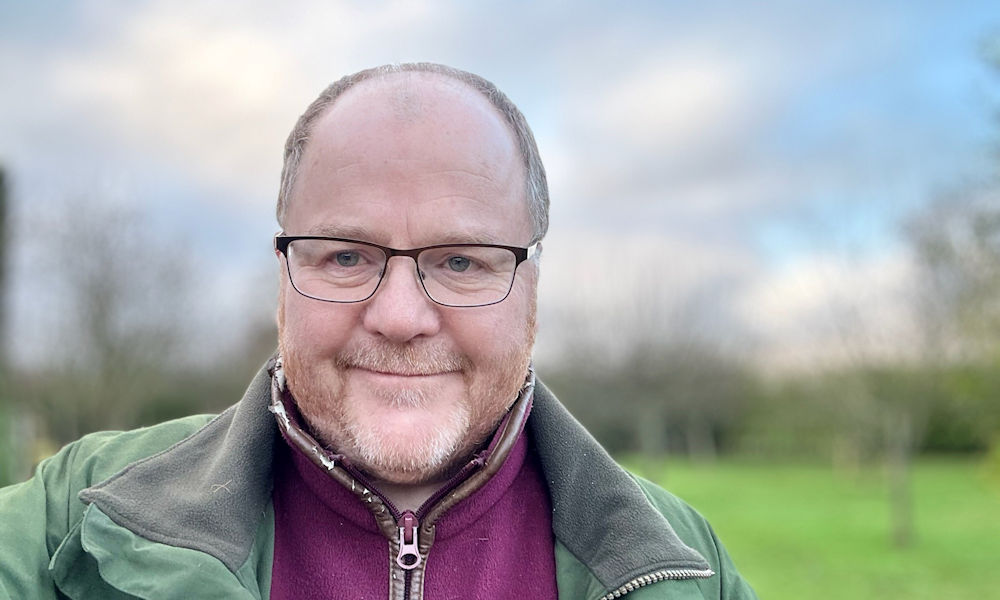
Yesterday’s Budget 2024 had some important announcements for Mid Norfolk and our area more widely — whilst being responsible with taxpayer’s money.
£500m to extend the Household support fund — a key issue for the most vulnerable here in Mid Norfolk.
£105m for new SEND schools — a key priority of mine here in Mid Norfolk.
Vital funding for sports facilities — such as at Hingham, Attleborough, Mattishall, Hockering, Bawdeswell, Watton, North Elmham, Swanton Morley, Dereham, New Buckenham, Necton and Easton College.
Making work pay & our tax credits fairer — scrapping the single earner tax on child benefit and increasing the thresholds before it applies.
£3.1bn Fuel duty freeze and extended 5p/litre tax cut — a real help to hard-pressed working families in rural areas & key ask of mine before the budget.
National Insurance cut for households across Mid Norfolk — an average household saving of £1,826.
£2m small business recovery scheme and rise in VAT threshold — supporting the core of our local high streets.
£120m for Clean Tech — powering forward our #InnovationEconomy at the Norwich Research Park.
East-West Rail — bringing proper rail connectivity to our region, a long-running campaign of mine.
NHS digital systems fit for the 21st Century — a key issue for our local GPs who are all too often held back by slow, costly, and outdated paper systems.
£45m for Medical Research Charities
NHS Dentistry plan — targeted specifically for those who have struggled to find NHS Dental treatment.
Making sure big energy companies pay their fair share and do not profit from Putin’s War, with an extension to the Windfall Tax.
However, there is more still to do — whether that be investing in our key industries and local pubs, making sure people keep more of their hard-earned money, or securing targeted Rural Funding.
Having assembled and led 50 rural MPs ahead of this budget, we will continue pushing the Chancellor to make sure rural needs are properly understood by Whitehall. Not least on rural energy & fuel ‘Cost Of Living’ pressures.
Watch this space…
Full details of my campaign here
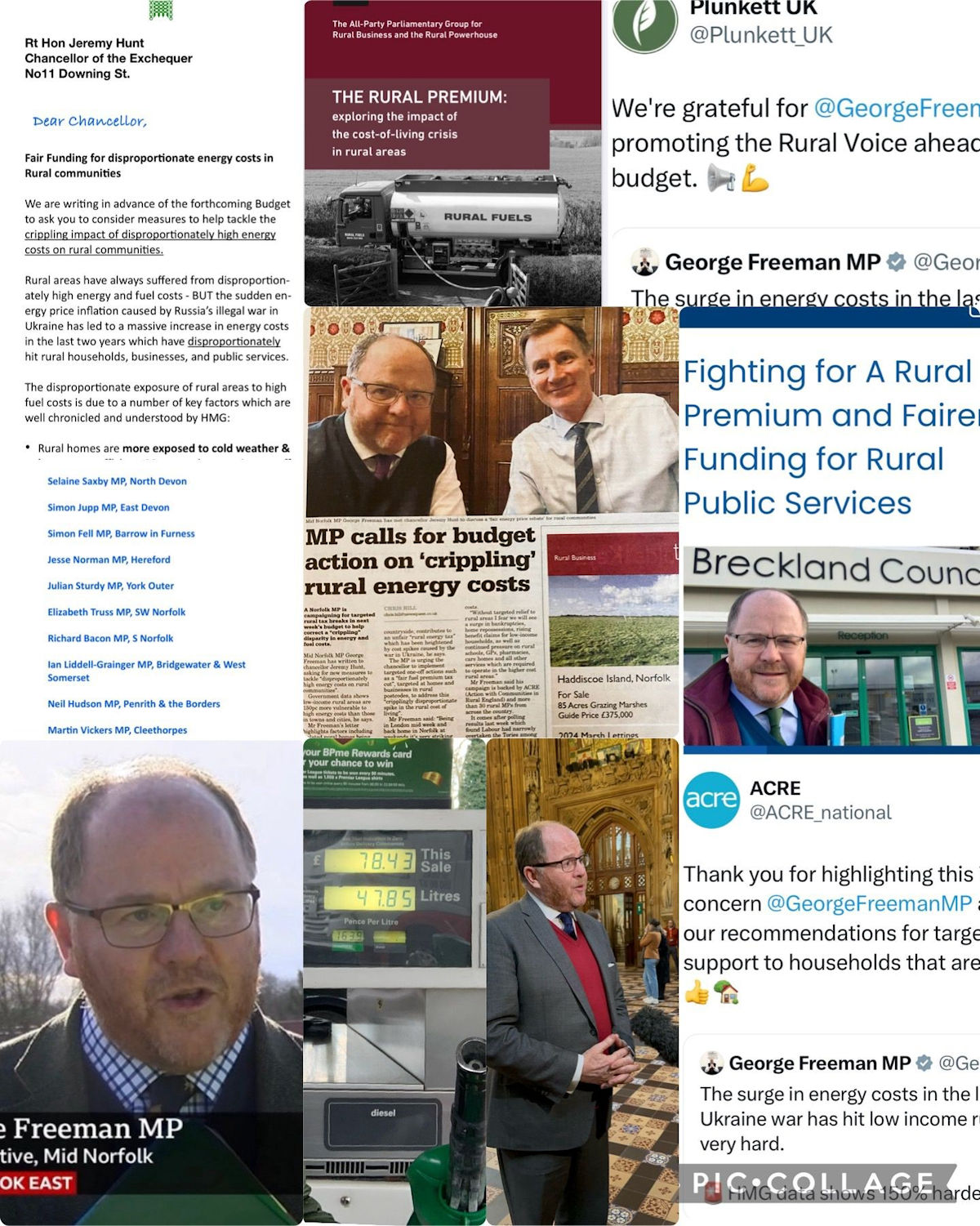
In a brief intervention in the Budget debate, George Freeman welcomes the allocation of £270 million towards advanced manufacturing in clean aviation and clean vehicles, as well as £120 million for clean tech manufacturing.
George Freeman (Mid Norfolk) (Con)
Does my hon. Friend agree that it is extraordinary that the hon. Member for Brighton, Pavilion (Caroline Lucas), representing the Green party, did not welcome the £270 million for advanced manufacturing in clean aviation and clean vehicles, and the £120 million for clean tech manufacturing? That is the UK investing in the technology of clean growth, is it not?
Harriett Baldwin
It is indeed, and I am glad that my hon. Friend welcomes that, even if it was not welcomed by the representative of the Green party.
George Freeman highlights the dentistry crisis in rural Norfolk and, whilst supportive of the dental recovery plan as a long-term solution, calls on the Government to work with the NHS Norfolk and Waveney integrated care board to find a way to get more money to help dentistry in Norfolk now.
George Freeman (Mid Norfolk) (Con)
Rural Norfolk is experiencing a dental crisis and a generation of children are in danger of going without dental care. I welcome the dental recovery plan, but I notice that it will be four or five years before we get more dentists. Last week, NHS Norfolk and Waveney integrated care board announced a £17 million underspend on dentistry. Will the Minister agree to meet with me and the ICB to work out how we get more money out now to help dentistry in Norfolk today?
The Secretary of State for Health and Social Care (Victoria Atkins)
One of the many ways we have tackled access to dental care is to ensure that those dentists who have a contract to conduct NHS work are using them to the top of their licence. We are encouraging dentists to do that through the new patient premium and a higher rate paid for units of dental activity. There is so much more to the plan. Labour keeps trying to claim credit for our plan, but the truth is that our plan promises 2.5 million appointments while its plan promises a miserly 700,000.
If people can’t afford to pay their energy bills, they are pushed towards homelessness – which is happening to far too many in areas like Mid Norfolk.
Areas like ours are hit approximately 150% harder by energy price rises – which is why I have assembled and am leading a team of 50 rural MPs to push for targeted rural relief in the Budget today and beyond.
See the above video I filmed yesterday with Marie-Claire, CEO of the Hopestead Charity doing great work in Mid Norfolk.
To see my question to the Secretary of State on rural homelessness in Department for Levelling Up, Housing and Communities OPQs this week, please click here
To find out more on my wider campaign for Fairer Rural Public Services Funding and additional targeted support for rural areas with energy, fuel costs and the cost of living, please visit my campaign page here
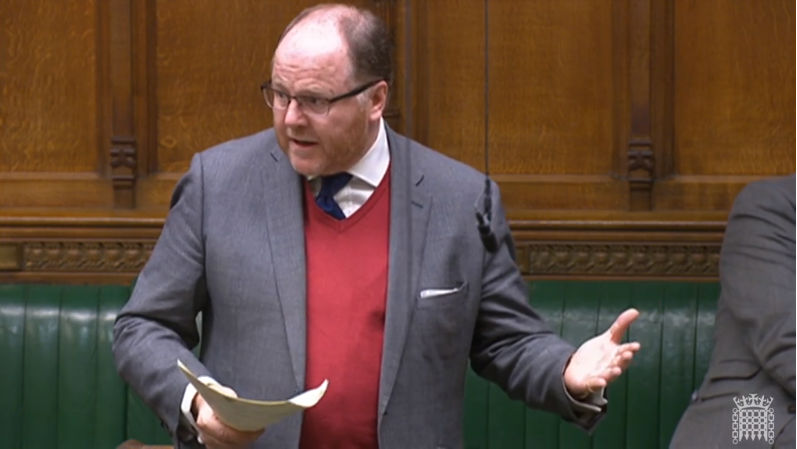
George Freeman highlights the dentistry crisis in rural Norfolk and, whilst supportive of the dental recovery plan as a long-term solution, calls on the Government to work with the NHS Norfolk and Waveney integrated care board to find a way to get more money to help dentistry in Norfolk now.
George Freeman (Mid Norfolk) (Con)
Rural Norfolk is experiencing a dental crisis and a generation of children are in danger of going without dental care. I welcome the dental recovery plan, but I notice that it will be four or five years before we get more dentists. Last week, NHS Norfolk and Waveney integrated care board announced a £17 million underspend on dentistry. Will the Minister agree to meet with me and the ICB to work out how we get more money out now to help dentistry in Norfolk today?
The Secretary of State for Health and Social Care (Victoria Atkins)
One of the many ways we have tackled access to dental care is to ensure that those dentists who have a contract to conduct NHS work are using them to the top of their licence. We are encouraging dentists to do that through the new patient premium and a higher rate paid for units of dental activity. There is so much more to the plan. Labour keeps trying to claim credit for our plan, but the truth is that our plan promises 2.5 million appointments while its plan promises a miserly 700,000.
So, as we build up the Budget, my message to the Chancellor is very clear. Rural areas face a cost of living crisis because of the cost of energy in the last two years.
Please see the short video update on my ongoing campaign above.
To read more about my recent meeting with the Chancellor and my letter to him (now backed by over 30 MPs, a wide variety of rural agencies and organisations, and a number of local Mid Norfolk pubs, GP surgeries, businesses, care homes and community groups), please click here
See my interview on BBC Radio Norfolk this past Friday here
And see more on my question to the Secretary of State at Department of Levelling Up, Housing and Communities OPQs yesterday here

35 years ago when I worked at the NFU, the mad EU Common Agricultural Policy was generating huge surpluses of unwanted food and was calling for a switch to subsidise lower production.
Now we need sustainable intensification.
Great to join the NFU Breakfast event this morning to discuss how.
To find out more about my work on ‘Food, Farming and the Environment’, please visit my campaign page here
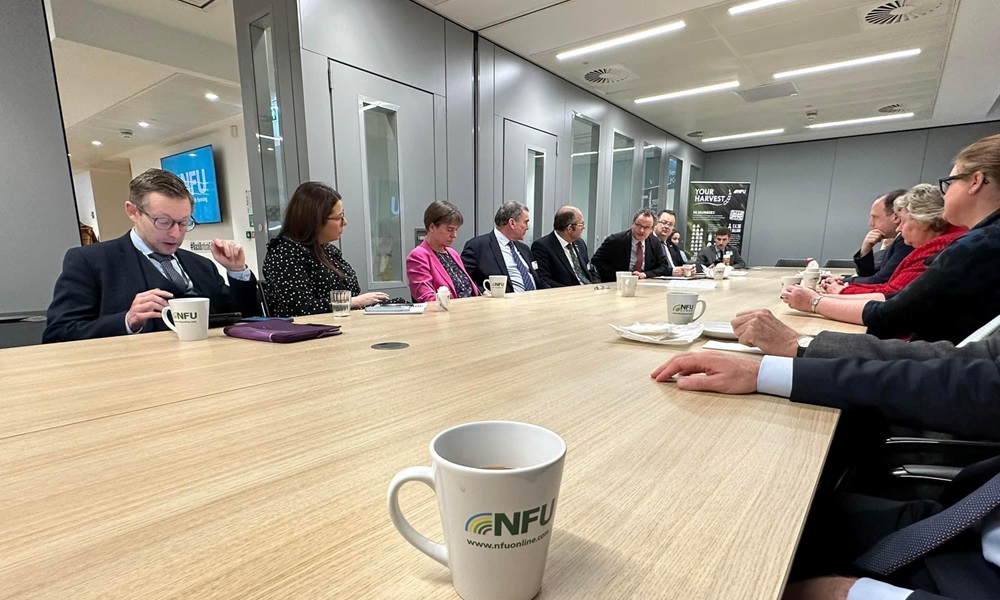
In a wide-ranging speech, George Freeman urges the Government to avoid creating a jungle of well-intended green tape and allow the farming industry to grasp the opportunities presented by Brexit for a new agricultural revolution in which the UK leads the world on delivering high-quality, safe, highly productive, low-input agriculture based on innovation with science, data and metrics.
George Freeman (Mid Norfolk) (Con)
It is a great pleasure to speak from the Back Benches in this farming debate, and to welcome the Secretary of State—I have not seen him yet in this role—and the great Under-Secretary of State for Environment, Food and Rural Affairs, the hon. Member for Keighley (Robbie Moore). I come from a farming family; it is nice to know that we are in such strong hands, and to hear such cross-party support for this key industry. The sector will be grateful to know how strongly it is represented across this House.
I do not have an interest to declare, except that as I come from a farming family, I narrowly escaped a career in farm management. I worked for Greens of Soham and used to be a director of Elsoms Seeds. I also worked for the National Farmers Union back when there was a thing called the Ministry of Agriculture, Fisheries and Food, and I used to chair the all-party parliamentary group on science and technology in agriculture. I take this opportunity to thank Minette Batters for her extraordinary leadership of an organisation that is at times not given to agility and clarity. She has brought clarity to the sector. I wish Tom Bradshaw, her successor, all the very best.
I think the House knows that I was not a great believer that the Brexit referendum would be immediately and easily implementable—I thought it would cause some difficulties and problems—but the one thing that I was very excited about was the opportunity to replace the appalling common agricultural policy, and all its mess, bureaucracy and chaos, with a UK farm and agriculture support framework. That remains an exciting opportunity. Such a framework would give this great industry—that is what it is—security in the long term. History shows that when we give that to farmers, they give us back exactly what we want. We need a long-term, secure policy, that has enough support and flexibility to allow marginal hill farmers to protect the uplands and the beautiful countryside that we love; that supports small family holdings, whose economic marginality requires diversification; and that supports all those other activities that we want to support. In my part of the world, East Anglia, global, world-class, competitive agriculture can lead the way in growing the food that the world needs. There is a huge opportunity.
I observe that in my 14 years in the House, agriculture has gone from not being properly recognised as an industry, and almost being seen by the Government as an activity of park keeping, to being, after the pandemic and Ukraine, a hugely important strategic sector that is key to food security and an opportunity for us globally. We need to double world food production by 2050 on the same land area, with half as much water and energy. That is a global grand challenge. This country is a powerhouse in agricultural science, research and technology, and can help make that possible. The opportunity is for us to set out a framework that unlocks the genius of our agricultural sector, so that we can show the world how it is done. If we get that right, we will invigorate the rural economy.
Of course, Brexit was eight years ago. I pay tribute to the Government’s various commitments: the £2.4 billion ringfenced commitment, the sustainable farming incentive, countryside stewardship, the food innovation programme, the food strategy, the animal health and welfare pathway, ELMS, and the Prime Minister’s commitment at the recent NFU conference. The real key is ensuring that the farming community feel and see long-term, clear, sustainable support.
I want to highlight one or two things that the farmers of Mid Norfolk say we have still to get right. First, they highlight the importance of a really reliable, long-term policy framework for the commercial sector, as well as an environmental framework for skills and for innovation. For 40 years after the war, the sector knew what we wanted it to do. It needs to know that we know what we want it to do, and that we will not change our mind every five, three or two years.
Secondly, agriculture must be recognised as a strategic industry that is key to our balance of payments, food security and ability to connect to those huge global markets. Public support figures show that the public are with us now—they were not 20 or 30 years ago; they did not think of it as a great industry that they wanted to support, but they do now.
Thirdly, we must understand that farmers are, first and foremost, mainly small businesses. They are not sophisticated; generally, they are not people with degrees or MBAs in business management. They are people who love what they do. We need to give them a framework that works for them as small businesses. Farming is a very unusual business, which invests most of its costs up front in the hopeful pursuit of revenue and profit downstream. Not many businesses do that. We need to understand that reality, as that is partly why farms need such security.
A number of colleagues have talked about food security. We are not destined only to grow the root crops, potatoes and traditional crops here, and to import the salad crops. Incredible innovations in vertical farming mean that we are now able to produce salad crops in this country. I have visited vertical farms—we have a great one in Norfolk at Fischer Farms. They use a fraction of the land area, with a fraction of the energy and chemicals used in traditional farming. There is no reason why that food security target could not be a lot higher.
Of course we all want environmental agriculture. I pay tribute to Kevin Bowes, the Breckland farmers, the Upper Wensum farmers group and the farmers at Wendling Beck. Farmers in Mid Norfolk are shaping best practice for agri-environment schemes. I recently visited a flagship project with Natural England: 20 or 30 people had come up from London, having bought their wellies at the garage; and Tony Juniper was preaching rewilding. I went to look at some land that, as a farmer’s boy, I would think you could probably get two hectares or an acre out of—and the finest minds in the land were trying to work out how to get nothing out of it, at a time when we really need food production. I am worried that the E in DEFRA sometimes triumphs over the F, the R and the A. Food needs to be right back at the heart of the Department; I know that the Secretary of State and the Minister are committed to that.
I make the point about the environment because we all know that, traditionally, agriculture has been a very high emitting industry. We need to show the world how to move to a low-emission agricultural sector. We are well positioned to do that, not least in agricultural genetics and breeding science at the Norwich Research Park, where we are pioneering drought-resistant crops that do not need highly carbon-intensive chemicals, and disease-resistant and drought-resistant crops for the rest of the world. In our chase for net zero, the left hand and the right hand need to be co-ordinated. We are not doing anything for net zero if we are disrupting farming in East Anglia with endless solar farms, cables and pylons.
Sir Edward Leigh (Gainsborough) (Con)
There is a simple thing that the Department can do, which I have asked it to do again and again: not put solar farms on 3b land. We put them on warehouses or inferior land, but not on good agricultural land in Lincolnshire and Norfolk.
George Freeman
I agree. If we are to lead the world in net zero agriculture, it is all about metrics and data. It is about picking up a pint of milk, a potato or a loaf of bread and knowing its environmental footprint. With that, we can start to give the sector incentives and rewards for driving down the environmental footprint. Without it, we are condemned to follow environmental policies that are emotional and not connected to proper science and research. If we get that right, the UK could be a leader in setting those environmental metrics.
That brings me to water quality. I commend the fact that UK agriculture has achieved a 75% reduction in pollution—that is very right. In our part of the world, the nutrient neutrality muddle has been a serious blow to farmers who are taking water quality seriously by reducing pig effluent and trying to get the balance right. Clunky, bureaucratic, big schemes in Whitehall that were not thought through properly are causing chaos in our part of the world in both agriculture and housing.
That brings me to flooding, on which I agree with the hon. Member for Selby and Ainsty (Keir Mather)—it is good to hear colleagues from all corners of this House getting the problem. Large parts of Mid Norfolk are currently under water. That is not good for agricultural productivity. Farms are holding water, for which they receive no support. There has been a lot of talk recently of “from the river to the sea.” The basics of drainage are that rivers are there to drain water off the land into the sea, and we could do with the Environment Agency putting dredging and the clearing of rivers at the top of the priority list to ensure that we get the water off the land properly.
Mark Menzies (Fylde) (Con)
My hon. Friend is making a powerful point. That issue is not just limited to Norfolk. The Secretary of State will know, being a Fylde lad, that it is affecting my farmers. We are crying out for water draining off land and letting farmers farm.
George Freeman
I could not agree more. The Secretary of State, whose constituency is North East Cambridgeshire, has lived the reality of getting water off the land as much as anybody.
That brings me to labour shortages. We have had real problems in the last few years: post Brexit, post pandemic and with the minimum wage, farmers are struggling. When a horticultural grower of the calibre of Andy Allen has to plough his prime English asparagus crop back into the land because he cannot find anyone to cut it, we are in real trouble. Some of our agricultural colleges are fantastic—I think I still have a place at Harper Adams if this career does not work out—but I worry that Easton College in Mid Norfolk is not properly anticipating the future needs of a high technology agricultural industry. We need to nurture the skills of tomorrow. Our young farmers get it, but we need to give them the courses.
I echo the comments that a number of Members have made about the difference between landowners and farmers. They are not the same thing. Many farmers I see are contract farmers—they are working 24/7, covering huge amounts of land and operating with higher and higher costs. The environmental payments tend to go to the landowners. We need to look after the farmers: the people who are developing those skills and inspiring the next generation to come into this great industry. If we end up with an industry where the hedge funds own all the land and no one is able to farm it, we will have done ourselves no favours. Quite a lot of those pressures explain why we have such a problem with mental health in agriculture. One farmer a week is taking their life. We need to think about what is driving that.
I applaud the Government’s work on production standards. We have a great opportunity in free trade deals to set the higher standards and to show the world how the UK produces more with less. I would offer a zero tariff only to those who are using the world’s very best technologies for zero-emission agriculture, and create a market for the exporting of our net zero technologies. Sustainable intensification—delivering more with less—is not just a strapline. The world desperately needs us to help deliver that. In our sector we have huge strength: the John Innes Centre at the Norwich Research Park, the Sainsbury Laboratory in Aberystwyth, and at Roslin and Wellesbourne. We are a global powerhouse in science research. We spend about half a billion a year on it, but it does not yet feel like the agricultural sector is underpinned by a half a billion of research. I know that the Secretary of State is thinking hard about how that science and research is better pulled through.
That brings me to agritech—a huge global sector. I was proud to set up our first agritech industrial strategy, the catalyst fund and the centres with my noble Friend Lord Willetts. We have some amazing agritech companies, but the key is to adopt the technologies they are producing. I pay tribute to companies such as Tropic Biosciences and to the work going on at Rothamsted. But when a company like the Small Robot Company develops brilliant technology but cannot find a market here to use it, I think that tells us as policymakers that we have to create a market in which those technologies are commercially viable and adoptable—otherwise we will end up incubating the rest of the world’s agritech sectors and not actually deploying the technologies here.
I will close by mentioning gene editing, which is a huge strength here in the UK—not just in disease resistance and drought-resistant crops, and shifting from chemical to biological control systems, but in nutraceuticals, functional foods and novel foods. We could lead the world in a whole new sector of agriculture, but that regulatory leadership is key.
The opportunity that people voted for eight years ago is still there. It is being born slowly and there have been many disruptions, but it is exciting. If we get this right, we could trigger and be the crucible of a new agricultural revolution in which we show the world how to deliver high-quality, safe, highly productive, low-input agriculture based on innovation with science, data and metrics. The UK could export that around the world. The alternative is that we create a jungle of well-intended green tape that gets in the way of a fundamentally commercial sector leading us into that new dawn. I know that DEFRA Ministers understand that. My job is to speak for the people of Mid Norfolk, and to ensure that we in this House show that we get it and that we are there for a new generation, who want to do the right thing for this country and for the globe.
